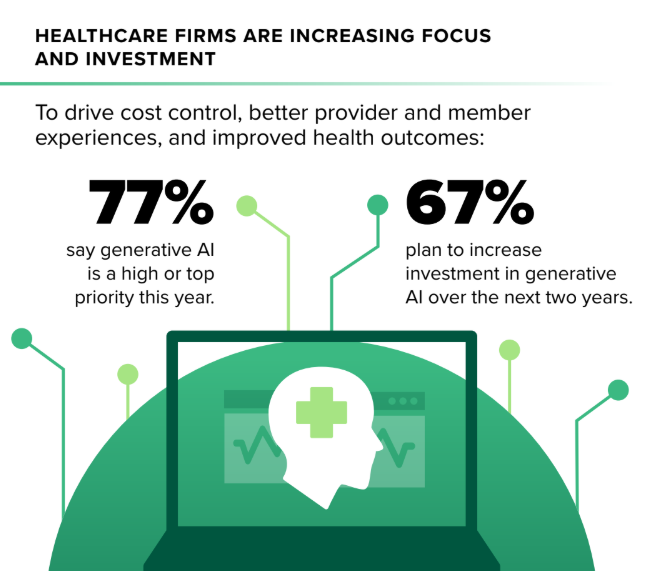
Generative AI is reshaping industries worldwide, and healthcare is no exception.
From improving patient engagement to streamlining administrative processes, AI-driven innovation holds the potential to revolutionize the way healthcare organizations operate.
However, despite growing investment and enthusiasm, many healthcare firms remain stuck in the experimentation phase, struggling to transition toward a well-defined AI strategy.
A recent study by Forrester Consulting highlights a critical challenge: while 77% of healthcare firms plan to increase investment in generative AI over the next two years, 64% admit they have prioritized short-term experiments over long-term strategy.
This gap between experimentation and execution could undermine the transformative power of AI. To fully capitalize on AI’s potential, healthcare leaders must shift their focus from pilots to an intentional, strategic approach.

While experimenting with generative AI is a necessary step in adoption, an overreliance on short-term projects can create several roadblocks:
These challenges are exacerbated by the fact that 59% of healthcare leaders agree that the pace of AI evolution makes it difficult to set a long-term strategy.
Yet, without a clear plan, healthcare organizations risk falling behind competitors who successfully embed AI into their core business operations.
One of the biggest roadblocks to generative AI adoption is data management. The study reveals that:
Without a strong data foundation, AI initiatives cannot deliver their full value. Healthcare organizations must invest in data infrastructure that enables seamless access, integration, and utilization of structured and unstructured data.
This requires modernizing data governance frameworks, ensuring data privacy, and adopting AI models capable of working with complex and evolving datasets.
To transition from AI experimentation to a strategic approach, healthcare leaders should focus on three key areas:
Before generative AI can drive meaningful impact, organizations must address the challenges of data quality, accessibility, and governance. This means:
With AI adoption comes responsibility. Healthcare firms must implement governance frameworks that:
The study highlights that 46% of healthcare leaders seek partners who can provide AI and data governance expertise, underscoring the importance of structured oversight.
Rather than investing in one-off AI projects, organizations should prioritize:
Healthcare firms recognize that they cannot navigate AI adoption alone. The study shows that:
Collaborating with the right healthtec partners can accelerate AI adoption while ensuring compliance, scalability, and long-term success.
In healthcare, as in sales, the success of AI adoption hinges not just on the technology itself, but on how it's integrated into daily workflows.
Just as sales reps initially resisted AI tools until Agentforce reframed them as real-time, conversational coaches rather than administrative burdens, healthcare providers may be hesitant if AI feels like added complexity.
The key lesson from Agentforce’s success is clear: when AI is personalized, embedded into real-time decision-making, and positioned as an ally - not a task - adoption follows.
For healthcare leaders looking to move beyond pilots, this mindset shift can be the bridge between experimentation and enterprise-scale impact.
Generative AI has moved beyond the experimental phase and is now a key differentiator in the healthcare industry.
To stay ahead, healthcare leaders need to shift their focus from short-term pilot programs to a well-defined AI strategy that supports their long-term objectives.
Building a strong data foundation, establishing clear governance frameworks, and forming strategic partnerships will be critical in harnessing AI’s full potential.
Done right, this approach can lead to greater efficiency, better patient experiences, and improved health outcomes.
The industry is at a turning point - those who take a strategic approach now will be the ones driving its future.